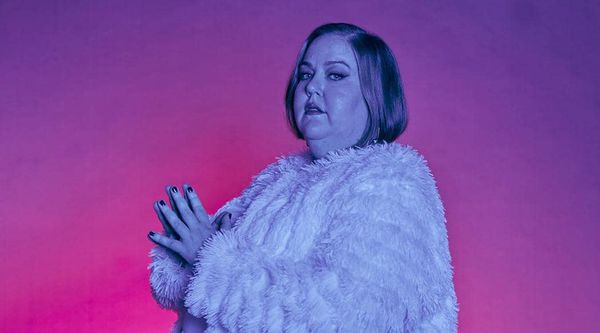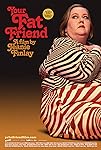Eye For Film >> Movies >> Your Fat Friend (2023) Film Review
Your Fat Friend
Reviewed by: Jennie Kermode

Just as there is periodically a glut of fiction films on a particular subject – vampires, restaurant kitchens, queer daughters developing a deeper understanding of their immigrant mothers, etc. – so it can happen in documentary. That filmmakers have finally turned their attention to the subject of fatphobia is a good thing. This profile of the author, podcaster and blogger Aubrey Gordon may reach people who missed the likes of Fattitude and The Body Fights Back because of its subject’s celebrity, but sadly it is one of the less interesting explorations of the topic.
Let’s get the obvious stuff out of the way first. Many people wince when they see the word fatphobia. Some of them are the same people who rush to find euphemisms rather than calling their friends fat (Aubrey much prefers honesty). It might wound like the ultimate ‘woke’ nightmare, putting people’s feelings ahead of their health, and yet three questions arise which immediately complicate attacks on it. Firstly, is fat really a matter of choice? Secondly, is it always unhealthy? And thirdly, even when it is both those things, does that justify being a dick about it?
There are some fascinating issues related to the first point, which goes beyond health and disability, with factors like geography and capitalism also playing a role. It’s understandable that this film does not address them, however, because part of Aubrey’s argument has always been that individuals should not be obligated to discuss the reasons why their bodies are the way they are with every curious stranger. That it touches only lightly on the second question is more of a problem, because it has clearly led some viewers to switch immediately into righteous saviour mode and ignore its challenges. There is some focus on fat people being physical and having fun (whilst acknowledging the fact that they often encounter verbal abuse when doing so – not what one would expect from folk who have their best interests at heart), but there is little counter the assumption of greater medical knowledge amongst critics (despite the fact that relevant science exists).
What we get, then, is a documentary very much focused on the prejudice experienced by fat people. Much of this revolves around the notion that being fat is a moral failing, and that in turn, as Aubrey notes, is linked to misogyny: fat women receive more abuse about their bodies than fat men because women are perceived as having an obligation to meet societal beauty standards. It’s a shame that although this is described as a cultural issue, we don’t get any focus on the celebration of fat bodies in other cultures – we are told but not shown. Aubrey herself is charismatic, funny and sexy, but she’s placed in a position where she has to do all the work herself rather than pointing to thriving counter-trends. Perhaps she likes this. The film certainly gives the impression that she enjoys being a revolutionary, but all the same, it feels that time is being wasted as we watch her reinvent the wheel.
Her revolutionary stance has won her a lot of fans. This film follows her over several months following her receipt of a commission for her first book, What We Don’t Talk About When We Talk About Fat, and there’s some entertaining material here as she wrestles with the fact that she’s about to fulfil a longstanding ambition but has been given little real advice on how to go about it (many inexperienced authors will relate). It helps that she has long taken an interest in books on the subject, and she shows us some of the tomes in her collection, which are hilarious in their presumptuousness, or at least would be if one were not aware of how much hurt they must have caused to readers. Most of them use shame to try to persuade readers to adopt restrictive diets. Some even employ religious shame. They’re wonderfully kitsch and chillingly awful.
Dieting, as has been pretty well established, doesn’t work for everyone, and the last couple of decades has seen a rise in radical diet ideas which are frankly dangerous. Aubrey remembers being taken to Weight Watchers by her mother when she was just 13. She remembers the fear and shame around the family dinner table, when everything she put in her mouth was laden with moral weight. It’s really astonishing that she has turned out as confident as she is after enduring a childhood in which she was constantly treated as a disappointment, but she makes it clear that she had to do a lot of work to get this far. This section of the film will be particularly important to a lot of viewers because it invites those who have been through similar experiences themselves to recognise that they did not deserve such treatment.
Psychologists are pretty clear on this point: no matter the issue at hand, shame is a terrible motivator. All it does is damage people. Doubtless some of those targeting it st fat people think they’re doing good, but as Aubrey makes clear, the experience of encountering it repeatedly, from family and friends, from doctors, from strangers in the street, is exhausting. It makes it very difficult to get on with the ordinary stuff of life. In addition to this, she points out, fat people face continual difficulties simply because the world is designed for thinner people. They don’t fit into standard spaces. Shouldn’t changes be made to the built environment, in light of the number of people this affects? This, of course, taps into a wider narrative about disability and reasonable adjustments, but that’s barely addressed here. Viewers are likely to go away appreciating Aubrey’s frustrations and perhaps, if they share them, feeling validated, but without the tools to do anything about them.
What, then, is the film’s aim? Aubrey clearly hopes to prompt the general public to examine its prejudices, but one suspects that those who most need this kind of wake-up call will not watch the film in the first place. It’s effective enough as a portrait of a personable individual at a critical juncture in her life. Beyond that, however, its main function would seem to be in challenging internalised prejudice – fat people’s own socially induced negative feelings about themselves – and confidence building. In this regard it is likely to be successful, with much of the same energy as Aubrey’s very popular blog. Cinematographer Stewart Copeland's beautiful framing of fat bodies has a powerful effect. Beyond this, however, it feels rather slender, and that is a shame.
Reviewed on: 03 Feb 2024

















